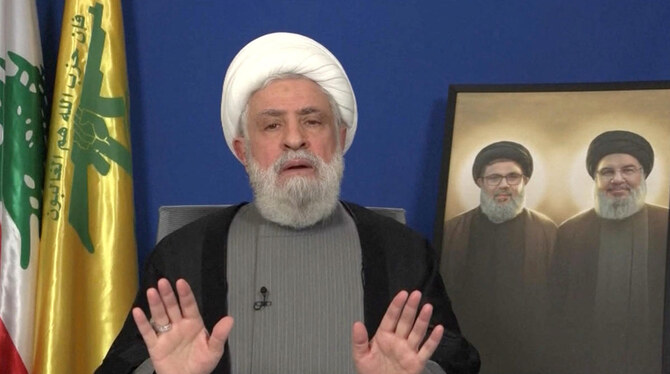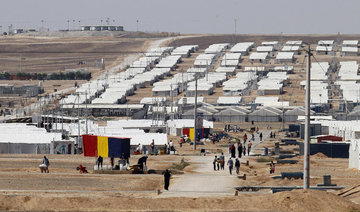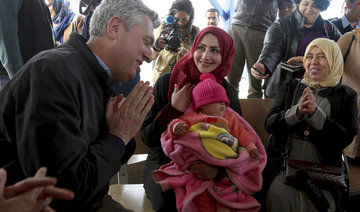AMMAN: Sara Al-Matoura watched through a window as her one-year-old daughter’s chest heaved up and down under a tangle of medical wires.
The 22-year-old mother from the Syrian city of Homs hadn’t eaten for a day and stayed up all night at a hospital in the Jordanian capital, Amman, holding her daughter, imagining the scalpel cutting her baby’s chest open soon.
Al-Matoura fled the Syrian war for Jordan in 2012, where she met Alaa Zatima, 34, another refugee from Daraa. They married and had a son, Omar, now 4 years old and waiting at home.
Al-Matoura was only four months pregnant with her second child when she found out the baby had a congenital heart defect known as tricuspid atresia, which has a mortality rate of 90 percent before age 10.
Jordanian doctors encouraged her to abort the fetus. Al-Matoura refused. “She is my gift from God,” she said. She named her daughter Eman — “faith” in Arabic.
Last week, Eman received life-saving open heart surgery, one of eight cardiac operations that Italian pediatric surgeons from the Vatican’s Bambino Gesu Hospital came to perform for free in Jordan.
She’s a lucky exception among Syrian refugees with severe medical conditions.
Dozens of others with cancer, heart defects and other complex conditions go untreated each month because of funding constraints, according to UN officials. The more expensive the treatment, the more likely their funding requests will be turned down.
Even primary care and basic services such as child delivery are increasingly unaffordable for refugees in regional host countries such as Jordan and Lebanon.
Some 5.5 million Syrians have fled their homeland since 2011, most settling in the region. Jordan currently hosts more than 650,000 Syrians registered by the UN refugee agency, though the government estimates the number of Syrians in the country is twice as high.
Seven years into the Syria conflict, with European and American doors increasingly shut to refugees and no signs of peace in Syria, neighboring countries like Jordan are cutting resources for Syrians, saying they cannot even afford to take care of their own people, let alone millions of refugees.
While Eman was in the operating room, another Syrian mother in Amman tried to keep her 12-year-old son Tamer from moving too much, afraid that his lips and hands would turn blue.
The 31-year-old fled the Damascus suburb of eastern Ghouta on the first day of the chemical attacks in 2013.
“They started at 3am and I left at 8 in the morning,” she said of the attacks, speaking on condition of anonymity for fear of repercussions for her family members in Syria. She brought her three boys, including a two-week-old baby, to Jordan.
Tamer, her second son, also has a congenital heart defect. His heart faces the wrong way, affecting his blood and air flow. When he moves too much, he loses his breath and turns blue.
Children with his condition should receive an operation at age five or six, according to Dr. Iyad Al-Ammouri, pediatric cardiologist at the University of Jordan Hospital.
But Tamer’s final surgery costs 15,000-20,000 Jordanian dinars ($21,000-$28,000), far more than his mother can afford. She supports her sons alone, with her husband still trapped in Syria.
One way Jordan used to help Syrians was by subsidizing their fees at government health facilities, so they paid the same as uninsured Jordanians. But the subsidies were canceled in February, meaning refugees must pay two to five times more for life-saving interventions.
Meanwhile, severe conditions like cancer and heart disease are subject to a special doctors’ committee that sifts through hundreds of cases each month, deciding which few to assist based on criteria including vulnerability, prognosis and cost.
Late-stage cancer treatment, for example, is usually denied. Expensive surgeries like Eman’s, which would have cost 15,000 dinars ($21,000) without the Italian doctors’ pro bono work, are also delayed or denied.
“Of course, people come back month after month and apply again, because they are desperate,” said Dr. Adam Musa, a UN public health officer who sits on the committee. “It’s painful.”
In January, 60 out of 143 refugee applications for emergency help were approved. The United Nations gave them approximately $2,000 each. There wasn’t enough funding for the rest, Musa said.
Younis Al-Hariri, an eight-year-old from Daraa, is one of those unfunded cases.
His 32-year-old mother said he was diagnosed with cystic fibrosis and several other liver conditions four years ago, while they were living in Jordan’s Zaatari refugee camp. He now needs a liver transplant that would cost 400,000 dinars ($565,000), Ridaa Al-Hariri said, adding that she owes 13,000 dinars ($18,000) to Jordanian hospitals for dialysis, blood transfusions and hospital stays.
Al-Hariri’s uncle, Hassan Al-Turkmani, also needs surgery for his two hands, paralyzed in clenched fists from months of electric shock torture in Syrian prisons. Jagged scars run down his thin arms. The 32-year-old father of four hasn’t been able to open his hands for seven years. The operation would cost 2,200 dinars ($3,100) per finger.
“There is no mercy here,” Al-Turkmani said.
A senior Jordanian government official said health subsidies were cut because Jordan is in an economic crisis. Syrian refugees are now paying health fees comparable to those charged to Jordanians, he said. Jordan remains on “high moral ground” for hosting the refugees at all, said the official, who spoke on condition of anonymity in line with briefing regulations.
Across the region, donor fatigue and decreased host country support have left millions of refugees on the edge of survival, even pushing some to return to Syria.
Lebanon has the most privatized and costly health care system among refugee-hosting countries in the region, according to the UN refugee agency.
There, 70 percent of Syrian refugees live in poverty. The UN refugee agency spent $51 million on 84,000 life-saving cases for Syrian refugees in Lebanon last year, yet could not cover most cancer cases with poor prognoses, chemotherapy, radiotherapy, or dialysis.
“There are very few NGOs that are able to provide support for some of these cases and we know that people have taken difficult decisions to return to Syria to access dialysis or cancer care,” said Dr. Michael Woodman, senior public health officer in the UNHCR’s Beirut office.
Bambino Gesu got involved at the request of Pope Frances, said Dr. Fiore S. Iorio, the hospital’s director of the department of pediatric cardiology and cardiac surgery, who operated on Eman.
Iorio said he and his colleagues were also compelled by a “moral obligation to help these unfortunate children,” either through surgery or by training Jordanian colleagues who will continue the work in the future.
After Eman’s surgery, her parents watched her breathe, her chest covered with bandages and wires, rising and failing in rhythm with the beeping monitor.
Doctors told them she would likely need another, more complicated surgery in two to five years.
“I don’t know where we will get the money then,” Al-Matoura said. “But thank God for healing her today.”
Syrian refugee baby gets life-saving surgery
Syrian refugee baby gets life-saving surgery

US vetoes UN resolution demanding a ceasefire in Gaza

The UN Security Council voted 14-1 in favor of the resolution sponsored by the 10 elected members on the 15-member council, but it was not adopted because of the US veto.
The resolution that was put to a vote “demands an immediate, unconditional and permanent ceasefire to be respected by all parties, and further reiterates its demand for the immediate and unconditional release of all hostages.”
Hezbollah chief says response to Israeli strikes on Beirut will be on ‘central Tel Aviv’

BEIRUT: Hezbollah chief Naim Qassem said in a speech broadcast Wednesday that the response to recent deadly Israeli strikes on Beirut would be on “central Tel Aviv.”
“The response must be expected on central Tel Aviv,” Qassem said, after deadly strikes on three central Beirut districts in recent days, one of which killed Hezbollah’s spokesman Mohammed Afif and four members of his media team.
More to follow...
Israel says not fighting Lebanese army, after soldiers killed

- “We emphasize that the (Israeli army) is operating precisely against the Hezbollah terrorist organization,” the military said
- “The (army) is looking into reports regarding soldiers of the Lebanon Armed Forces who were injured during the strike”
JERUSALEM: Israel’s military said Wednesday it was fighting the militant group Hezbollah in Lebanon, not the Lebanese army, after the latter said four of its soldiers were killed in Israeli strikes.
“We emphasize that the (Israeli army) is operating precisely against the Hezbollah terrorist organization and is not operating against the Lebanon Armed Forces,” the military told AFP in a statement.
The Lebanese army said Israeli fire killed a soldier Wednesday, a day after it said three other personnel died in a strike on their position in the town of Sarafand, some 40 kilometers (25 miles) from the southern border.
South Lebanon has seen intense fighting between Israel and Hezbollah militants whose group holds sway in the area.
Israel’s military said it struck “a terrorist infrastructure site in which a number of Hezbollah terrorists were operating in the area of Sarafand” on Tuesday night.
“The (army) is looking into reports regarding soldiers of the Lebanon Armed Forces who were injured during the strike,” it added, but did not refer to the other deadly incident mentioned by the Lebanese army.
Since September 23, Israel has ramped up its bombing campaign in Lebanon, later sending in ground troops, after almost a year of cross-border exchanges begun by Hezbollah in support of its Palestinian ally Hamas.
Israel insists on right to act against Hezbollah in any deal to end fighting

- Lebanon’s government is likely to view any such demand as an infringement on its sovereignty
- Hochstein told reporters the talks had made “additional progress”
BEIRUT: Israel’s defense minister says his country insists on the right to act militarily against Hezbollah in any agreement to end the fighting in Lebanon.
Lebanon’s government is likely to view any such demand as an infringement on its sovereignty, complicating efforts to end more than a year of fighting between Israel and Hezbollah that erupted into all-out war in September.
Defense Minister Israel Katz said in a statement Wednesday that “the condition for any political settlement in Lebanon is the preservation of the intelligence capability and the preservation of the (Israeli military’s) right to act and protect the citizens of Israel from Hezbollah.”
Lebanese officials mediating between Israel and Hezbollah have called for a return to United Nations Security Council Resolution 1701, which ended the 2006 war between the sides.
It calls for Hezbollah militants and Israeli forces to withdraw from a buffer zone in southern Lebanon patrolled by UN peacekeepers and Lebanese troops.
US envoy Amos Hochstein, who has spent months trying to broker a ceasefire, held a second round of talks on Wednesday with Lebanon’s parliament speaker, Nabih Berri, an ally of Hezbollah who has been mediating on their behalf.
Hochstein told reporters the talks had made “additional progress,” and that he would be heading to Israel “to try to bring this to a close, if we can.” He declined to say what the sticking points are.
Israeli strikes and combat in Lebanon have killed more than 3,500 people and wounded 15,000, according to the Lebanese Health Ministry. The war has displaced nearly 1.2 million people, or a quarter of Lebanon’s population.
On the Israeli side, 87 soldiers and 50 civilians, including some foreign farmworkers, have been killed by attacks involving rockets, drones and missiles. Hezbollah began firing on Israel the day after Hamas’ Oct. 7, 2023 attack triggered the war in Gaza.
That attack killed some 1,200 people in Israel, mostly civilians, and another 250 were abducted. Around 100 hostages remain inside Gaza, at least a third of whom are believed to be dead. Israel’s retaliatory offensive has killed nearly 44,000 Palestinians, according to local health authorities.
On Wednesday afternoon, the Lebanese army said in a statement a soldier was killed by an Israeli airstrike that hit his vehicle on the road linking Burj Al-Muluk and Qalaa in southern Lebanon. The Israeli military said it was looking into reports.
The night before, three soldiers were killed by an airstrike that targeted an army post in the town of Sarafand, near the coastal city of Saida.
Wissam Khalifa, a resident of Sarafand who lives next to the army post and was injured in the strike, said he was shocked that it was targeted.
“It’s a safe residential neighborhood. There is nothing here at all” that would present a target, he said. “Regarding the martyred soldiers, I don’t even know if there was a gun in the center. Why did this strike happen? We have no idea.”
The Lebanese army has not been an active participant in the fighting between Israeli forces and Hezbollah over the past 13 months, but more than 40 soldiers have been killed in the conflict.
Altogether, more than 3,500 people have been killed in Lebanon since Oct. 8, 2023, the vast majority of them in the past two months.
US envoy to travel to Israel in bid to seal Hezbollah ceasefire

- “So I will travel from here in a couple hours to Israel to try to bring this to a close if we can,” Hochstein said in Beirut
BEIRUT: US envoy Amos Hochstein said he will travel to Israel on Wednesday to try to secure a ceasefire ending the war with Lebanon’s Hezbollah group after declaring additional progress in talks in Beirut.
Hochstein, who arrived a day earlier in Beirut, said he saw a “real opportunity” to end the conflict after the Lebanese government and Hezbollah agreed to a US ceasefire proposal, although with some comments.
“The meeting today built on the meeting yesterday, and made additional progress,” Hochstein said after his second meeting with Parliament Speaker Nabih Berri, endorsed by the Iran-backed Hezbollah to negotiate.
“So I will travel from here in a couple hours to Israel to try to bring this to a close if we can,” Hochstein said.
The diplomacy aims to end a conflict that has inflicted massive devastation in Lebanon since Israel went on the offensive against Hezbollah in September, mounting airstrikes across wide parts of the country and sending in troops.
Israel says its aim is to secure the return home of tens of thousands of people evacuated from its north due to rocket attacks by Hezbollah, which opened fire in support of Hamas at the start of the Gaza war in October 2023.
Hezbollah, still reeling from the killing of its leader Hassan Nasrallah and other commanders, has kept up rocket fire into Israel, including targeting Tel Aviv this week. Its fighters are battling Israeli troops on the ground in the south.
Although diplomacy to end the Gaza war has largely stalled, the Biden administration aims to seal a ceasefire in the parallel conflict in Lebanon before President-elect Donald Trump takes office in January.
“We are going to work with the incoming administration. We’re already going to be discussing this with them. They will be fully aware of what we’re doing,” Hochstein said.




















